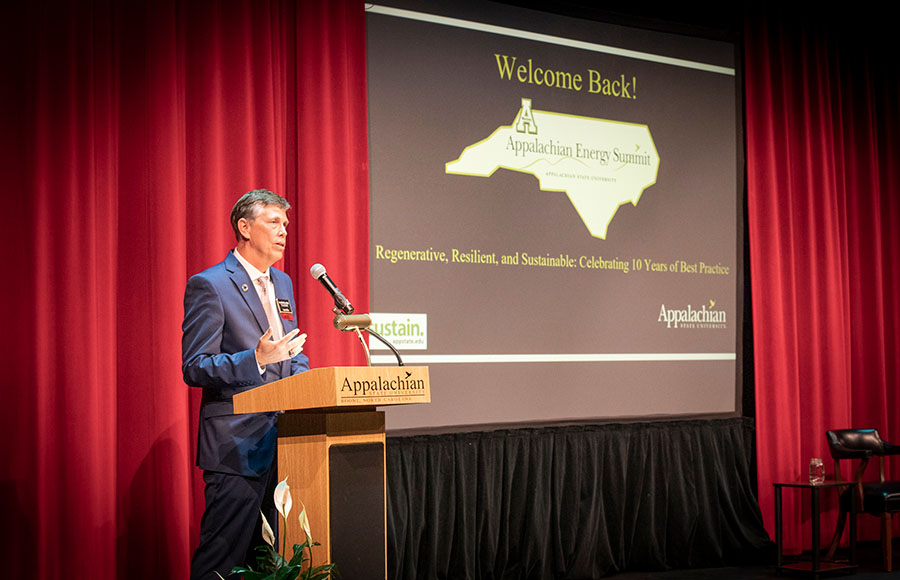
App State Chief Sustainability Officer Lee Ball gives opening remarks at the 2022 Appalachian Energy Summit, titled “Regenerative, Resilient and Sustainable: Celebrating 10 Years of Best Practice.” The summit hosts energy leaders from different government agencies and businesses, as well as students and representatives of the member institutions in the UNC System. This year the attendees learned that the state had reached $1.6 billion in avoided energy costs and is on its way to the $2 billion goal set for 2025. Photo by Troy Tuttle
BOONE, N.C. — The annual Appalachian Energy Summit has spearheaded a decadelong effort to reduce energy use, resulting in $1.6 billion in avoided energy costs by the University of North Carolina System, North Carolina community colleges and other state agencies since 2002–03.
Since 2012, the Appalachian Energy Summit — a three-day, annual event envisioned and hosted by App State — has gathered faculty, staff and students from colleges and universities, energy managers and visionaries, and government and industry leaders to share ideas and put into action ecological, financial and social processes designed to improve energy efficiency across the UNC System, the state and beyond. The expectation is that the UNC System and state partners will realize $2 billion in avoided costs by 2025.
“For a decade, the Appalachian Energy Summit has facilitated a collaborative learning environment in energy efficiency,” said App State Chancellor Sheri Everts. “The resulting energy savings are impressive financial gains for North Carolina taxpayers, and I’m proud that App State has been the driving force behind creating and presenting the summit each year, which also offers numerous opportunities for students to share their scholarship and learn from some of the most innovative minds in the energy industry.”
The UNC System continues to lead the state in energy reduction costs thanks to the efforts of all 17 System members. Since 2002–03, UNC Wilmington, Western Carolina University and App State have achieved the highest reductions of energy use by square foot, at 51%, 50% and 47%, respectively.
App State’s energy use reduction of 47% since 2002–03 exceeds the goal in Gov. Roy Cooper’s Executive Order 80: North Carolina’s Commitment to Address Climate Change and Transition to a Clean Energy Economy to reduce energy consumption per square foot in state-owned buildings by at least 40% from fiscal year 2002–03 levels.
App State has reached $48.9 million in avoided energy costs since the 2002–03 fiscal year. Additionally, the university has avoided water use costs totaling $13.5 million. App State has a combined $62.4 million in utility savings.
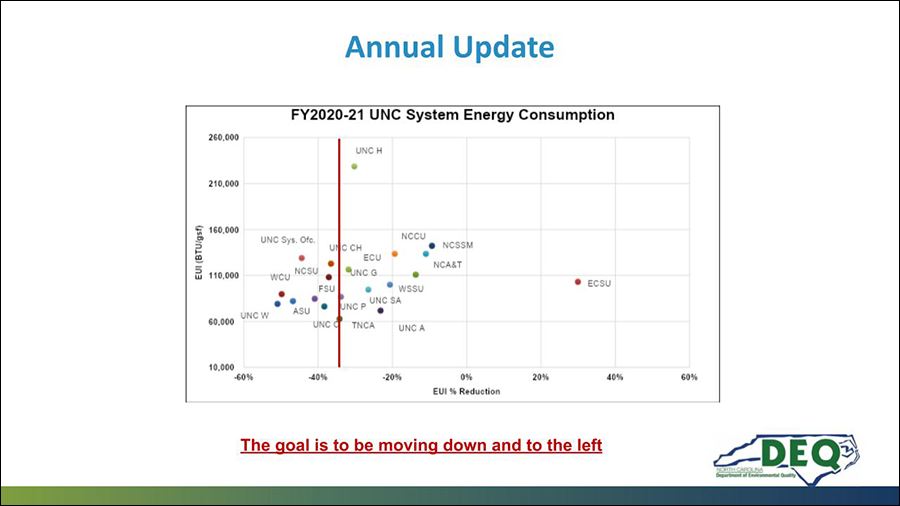
At the 2022 Appalachian Energy Summit, participants learned that the state has saved $1.6 billion in avoided energy costs since 2002–03. This scatter plot represents how each of the 17 schools in the UNC System are performing in the challenge to reduce energy use per square foot. The state goal, set in 2018, is to reduce energy consumption per square foot in state-owned buildings by at least 40% (measured from baseline 2002-03 fiscal year levels), and UNC Wilmington, Western Carolina University and App State are leading the way with 51%, 50% and 47%, respectively, in their reduction of energy use per square foot. Graphic courtesy of the North Carolina State Energy Office
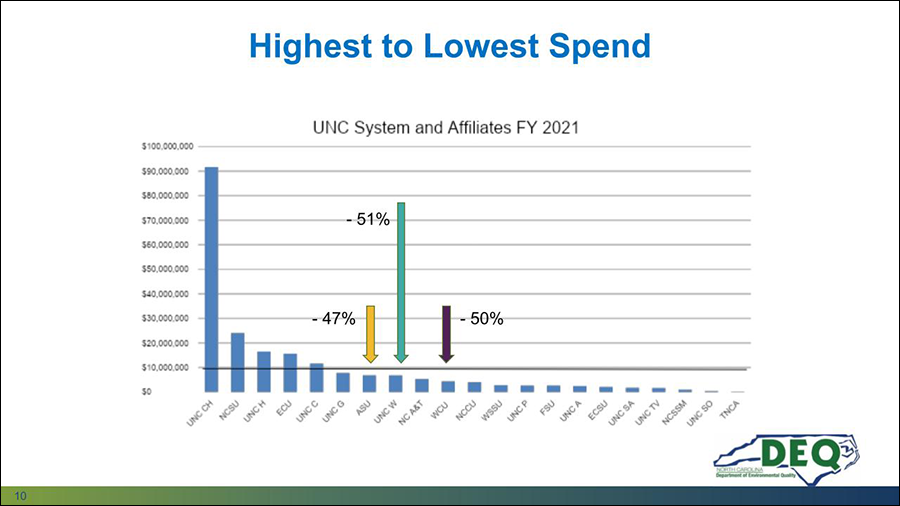
This graph provides a breakdown of the 2020–21 fiscal year energy spending amounts across the member institutions of the UNC System. The state has achieved $1.6 billion in avoided energy costs on its way to a 2025 goal of $2 billion. This graph also notes the percentages of reduced energy use by square foot that UNC Wilmington, Western Carolina University and App State have reached since 2002–03. Graphic courtesy of the North Carolina State Energy Office
The Appalachian Energy Summit is designed primarily for faculty, staff and students at institutions of higher learning, as well as local and state government staff, and employees of nonprofit organizations focused on energy and sustainability.
“We are delighted to return — in person — for the 2022 Appalachian Energy Summit,” said Dr. Lee Ball, chief sustainability officer at App State. “This summit continues to attract new attendees as well as our old friends focused on innovative ideas and solutions to help us all make measurable progress with our clean energy, energy efficiency, climate action and sustainability goals.”
The 2022 summit included a range of government, academic and business speakers. Attendees, including students, heard reports on current and proposed legislation to increase energy efficiency and sustainability through policy and spending actions. UNC System school representatives shared information about research and initiatives to lower their energy costs. Attendees also joined tours of App State’s campus gardens, high-performance greenhouse at the Sustainable Development Teaching and Research Farm, the campus compost facilities, the Renewable Energy Initiative (REI) and Team Sunergy’s solar vehicle workshop.
The Appalachian Energy Summit story — a decade of resilient success
Since its inception in fall 2011, the summit’s objectives have included:
- Educating students to be leaders of tomorrow.
- Reducing and stabilizing the UNC System’s average annual energy expenditures.
- Transforming and stimulating the North Carolina economy.
- Positioning colleagues in the UNC System and private universities as national leaders.
- Creating a culture of environmental and economic sustainability.
The summit has continued a founding objective to reduce and stabilize average annual energy expenditures of all UNC System institutions, positioning UNC System institutions as national leaders in sustainability education and stimulating the North Carolina economy through the support of green energy business infrastructure.
The summit has led to ongoing collaborative partnerships across the UNC System, resulting in the innovation and development of ways to cut energy costs. Its influence also now extends nationwide, with an open forum that includes individuals from universities, community colleges, local governments and K–12 schools who communicate regularly, sharing ideas and suggestions, contributing to the success and overall impact of the summit.
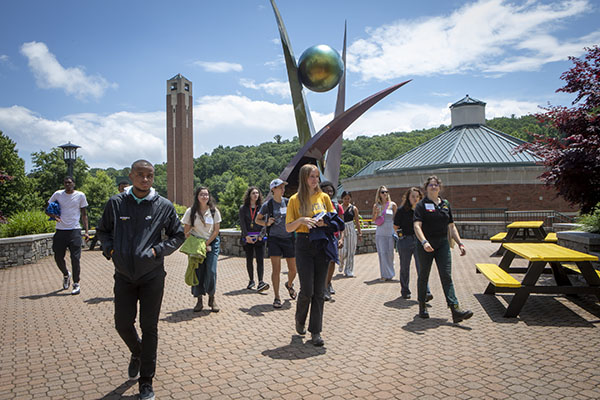
Students who attended the 2022 Appalachian Energy Summit participated in the concurrent Student Summit that included informational sessions, networking opportunities and tours of some of the sustainability-related projects App State conducts. The tours included stops at campus compost sites, campus gardens, and projects completed through the student-led Renewable Energy Initiative. Photo by Troy Tuttle

Students who attended the 2022 Appalachian Energy Summit participated in the concurrent Student Summit that included informational sessions, networking opportunities and tours of some of the sustainability-related projects App State conducts. The tours included stops at campus compost sites, campus gardens, and projects completed through the student-led Renewable Energy Initiative. Photo by Troy Tuttle

Appalachian Energy Summit students participate in a poster contest highlighting their energy-related research or project. The projects were related to renewable energy, climate and the environment, clean transportation, energy policy, power distribution and storage, emissions or any other topic on energy efficiency. The posters were judged by a panel from the Appalachian Energy Summit, with the highest ranking posters receiving a cash prize. Photo by Chase Reynolds
What do you think?
Share your feedback on this story.
About Sustainability and Energy Management at App State
Appalachian State University’s leadership in sustainability is known nationally. The university’s holistic, three-branched approach considers sustainability economically, environmentally and equitably in relationship to the planet’s co-inhabitants. The university is an active steward of the state’s interconnected financial, cultural and natural resources and challenges students and others think critically and creatively about sustainability and what it means from the smallest individual action to the most broad-based applications. The university offers both undergraduate and graduate academic degree programs that focus on sustainability. In addition, 100 percent of Appalachian’s academic departments offer at least one sustainability course or course that includes sustainability, and all students graduate from programs that have adopted at least one sustainability learning outcome. Learn more at https://appstate.edu/sustainability.
About Appalachian State University
As a premier public institution, Appalachian State University prepares students to lead purposeful lives. App State is one of 17 campuses in the University of North Carolina System, with a national reputation for innovative teaching and opening access to a high-quality, cost-effective education. The university enrolls more than 21,000 students, has a low student-to-faculty ratio and offers more than 150 undergraduate and 80 graduate majors at its Boone and Hickory campuses and through App State Online. Learn more at https://www.appstate.edu.

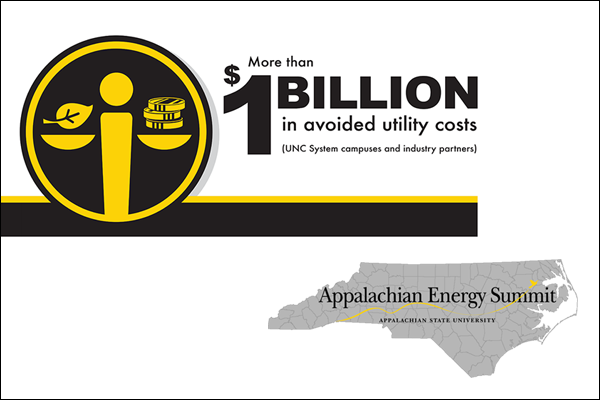



![How NCInnovation Is Rethinking Economic Development in North Carolina [faculty featured]](/_images/_posts/2026/02/rethinking-economic-development-600x400.jpg)







